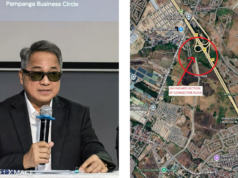CLARK FREEPORT – What’s worse than the P10-billion pork barrel scandal linked to Janet Lim Napoles?
The Alyansa Agrikultura posed this question in its position paper submitted to Malacanang, and then answered it: $4.82 billion or about P216.9 billion revenue losses from worsening smuggling in the country.
This, even as the group asked Malacanang to reestablish a cabinet oversight committee similar to the Cabinet Oversight Committee Against Smuggling (COCAS) founded in 2005 but abolished the following year.
“It had become too successful, for it exposed high-level officials involved in smuggling,” said the group chaired by Ernesto Ordoñez who provided members of Capampangan in Media, Inc. (CAMI) copies of its position paper.
The paper said that Pres. Aquino’s estimate of P200 billion losses from smuggling is “200 times worse than the P10-billion loss due to the alleged Napoles scam over 10 years.” But it noted that “assuming 12 percent VAT and an average five percent tariff rate, the resulting revenue loss from the $28.37 billion underreported 2012 imports results in $4.82 billion or P216.9 billion.”
The Alyansa Agrikultura was referring to figures from the United Nations Trade Statistics saying that in 2012, foreign countries reported exporting goods worth $84.71 billion to the Philippiines, yet the Bureau of Customs (BOC) reported only $56.34 billion, or an underreporting of $28.37 billion.
The group also noted that the UN statistics indicated that underreporting of imports, which is largely smuggling, got worse from only six percent or $2.69 billion in 2005 to 33 percent or about $28.37 billion in 2012.
“If lost revenue is important, how much more painful is the loss of existing jobs caused by smuggling. Add to this the loss of potential investors who can provide our unemployed with the additional jobs they need for inclusive growth,” it added.
It cited a report from the Bureau of Agricultural Statistics that 20 percent of backyard hog raisers in the country lost their livelihood in the past two years due to smuggling of pork. The group noted that in the recent years, the only time that smuggling decreased was when the COCAS was established in 2005, when underreporting of imports went down from eight percent in 2004 to only six percent in 2005.
“This was because there was an effective check and balance mechanism to monitor and guide BOC activities,” the group recalled. It noted that the COCAS was chaired by then Interior and Local Government Sec. Angelo Reyes with high level representatives from the departments of fi nance, agriculture, trade and industry and justice and representatives from the private sector.
“The COCAS met at least once a month. BOC had no choice but to respond to COCAS questions and recommendations because of its multi-department and multi-sectoral composition,” the group recalled.
It lamented that “in 2006, COCAS was abolished. It had become too successful, for it exposed high-level officials involved in smuggling.”




